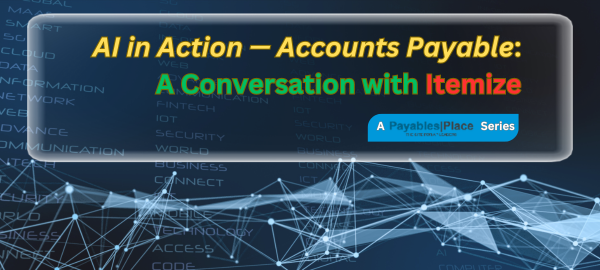A New AI Series on Payables Place
The power of artificial intelligence (AI) is undeniable. Its impact and influence are revolutionizing the Accounts Payable (AP) and Business-to-Business (B2B) payments automation market. According to research from Ardent Partners, AI will soon be ubiquitous in this sector, offering unparalleled efficiencies and capabilities. The transformative possibilities of AI will drive innovations in invoice processing, payment automation, fraud detection, and overall financial management, streamlining enterprise operations and improving business decision-making.
In view of these advancements, Ardent Partners is launching a special “AI in Action” interview series. Our “AI in Action” series represents an opportunity for our Chief Research Officer, Andrew Bartolini to sit down with senior executives at the ePayables solution providers that are focused on AI now and in the near-term and use these discussions as an opportunity to share their company’s focus on, expertise in, and vision for AI within the AP industry.
Today’s AI in Action profile features Steve Markle, Chief Operating Officer for Itemize.
Andrew Bartolini (“AB”): Steve, good to connect with you today! Can you believe that I’ve known you for more than twenty years? Briefly share your background in the ePayables industry?

Steve Markle: Andrew, time really flies by – we’ve come such a long way!! As you know, my name is Steve Markle, and I am the Chief Operating Officer at Itemize. I’ve spent over 25 years working in enterprise technology and SaaS products, specifically focusing on AI-powered financial automation. My experience spans leading roles at SAP Ariba and serving as the CEO of BirchStreet. At Itemize, I oversee product growth and execution strategies, ensuring we deliver seamless AI solutions that transform Accounts Payable (AP) and B2B payment processes, driving efficiency and productivity.
AB: You and I just delivered a webinar in this topic which our readers can find at this link. For those that missed it, can you share what, in your opinion, where are the biggest opportunities for AI to improve AP and B2B payment efficiencies and productivity?
SM: AI has tremendous potential to streamline traditionally manual, time-consuming tasks within AP and B2B payments. The biggest opportunities lie in invoice processing automation, data extraction at the line level, purchase order to invoice matching, invoice enrichment, and fraud prevention. AI can help reduce errors, improve compliance, and speed up processing times, directly translating into cost savings and enhanced productivity. Additionally, AI-driven insights can help businesses optimize their cash flow management and predict payment behaviors, enabling more strategic decision-making.
AB: How do you view your customers’ (and prospective customers’) AI attitudes?
SM: We’re seeing a shift where customers are increasingly open to adopting AI, especially as they see the tangible benefits it delivers in terms of efficiency and accuracy. Initially, some may be concerned about the complexity of AI implementation or whether it will replace jobs. However, once they understand how AI augments human efforts and delivers measurable ROI, their mindset shifts to embrace it as a valuable tool. Prospective customers are particularly keen on how AI can simplify their operations and solve specific pain points in AP and payments.
AB: What are the leading AI subsets (e.g., machine learning, natural language processing, deep learning, etc.) with the biggest impact on accounts payable/B2B payment solutions? And why?
SM: Machine learning (ML), natural language processing (NLP), and Large Language Models (LLMs) are three key AI subsets driving significant transformation in accounts payable automation. ML enables systems to improve over time by learning from data patterns, enhancing data extraction and processing accuracy. NLP is critical for interpreting unstructured data, such as invoices and contracts, which often come in various formats and languages, streamlining document management. LLMs, powered by deep learning techniques, enhance predictive analytics, helping businesses forecast payment cycles and detect anomalies or fraud in real time, ultimately improving operational efficiency and financial performance.
AB: How are you ensuring the accuracy and reliability of customers’ AI models (AI data output)?
SM: Accuracy and reliability are at the core of our solutions. At Itemize, we ensure this by continuously training our AI models on large datasets that reflect real-world scenarios, ensuring they remain adaptable and accurate over time. We also use a combination of supervised learning to maintain high-quality outputs without humans in the loop. Our systems are designed to flag anomalies and self-correct through reinforcement learning, further refining accuracy. We also prioritize transparency in our models, allowing customers to audit and understand AI-generated data.
AB: How does Itemize plan to support your AP clients if/when an AI skills gap exists?
SM: At Itemize, we recognize that not all of our customers will have deep AI expertise, which is why our solutions are designed to be intuitive and easy to use. We offer comprehensive training and support to help clients navigate and fully leverage the capabilities of AI in their AP processes. Additionally, we provide ongoing resources and support teams that help clients bridge any skills gaps. For more technical requirements, we often collaborate with clients to co-create AI solutions that align with their unique needs and workflows.
AB: Where do you see AI going within the ePayables (AP automation) market over the next five years?
SM: Over the next five years, AI will become increasingly embedded in the ePayables landscape. I foresee more sophisticated AI models that automate complex processes. AI will drive end-to-end automation, from invoice receipt to payment reconciliation, with little to no manual intervention. As AI matures, we’ll also see the integration of blockchain and advanced fraud detection algorithms, enhancing security and transparency. Companies will increasingly rely on AI-driven analytics to optimize their financial operations and make more strategic business decisions.
AB: Thanks for your time today Steve!
SM: My pleasure and I would also like to note that the paper that you and your team at Ardent Partners wrote – AI Rising: Rethinking Financial Transactions in the Modern Age – is a great primer AI for those working in AP, AR, and finance.
AB: Hah – that’s right. It’s fair to say I recommend that report! Thanks again!

